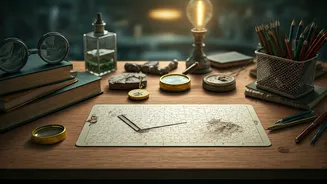The Visual Challenge
This visual puzzle invites you to test your observational prowess. Inside a commonplace illustration, six carefully hidden objects await discovery. The
challenge emphasizes the importance of visual acuity and sustained attention. This task encourages mental agility, demanding your complete focus to effectively pinpoint each concealed item. Many find it difficult to identify every element within the time limit. Can you spot them all? The goal is to stimulate your cognitive abilities through focused engagement. Success depends on keen vision and concentrated observation, encouraging the brain to function at its peak.
Boosting Brainpower
Regular engagement with puzzles of this nature offers substantial cognitive benefits. Consistent practice of this sort can sharpen one's problem-solving skills. Such activities train the brain to swiftly evaluate, categorize, and make decisions, enhancing overall cognitive performance. The ability to identify hidden objects requires a coordinated effort between visual perception and mental processing. This exercise of attentiveness contributes to the strengthening of neural pathways, improving the brain's capacity for concentration and awareness. As people repeatedly solve puzzles, they often find improvements not just in visual perception but also in overall focus and cognitive function, making it an excellent practice to boost mental dexterity.
More Than Meets Eye
Beyond simply being a fun activity, the practice of finding hidden objects provides multiple cognitive advantages. It not only sharpens visual perception but also serves to train the mind for enhanced focus and concentration. By regularly challenging your ability to observe details, your brain becomes more adept at filtering out distractions. The puzzles help develop faster decision-making skills. The activity promotes a more efficient cognitive response. People who actively engage in this type of mental exercise often report a greater ability to manage their attention, improving both professional and personal aspects of their lives. Overall, regular engagement with these puzzles can make your mind sharper.
The Mental Workout
Engaging in puzzles, like finding hidden objects, works your brain in a similar manner to physical exercise. These puzzles challenge your cognitive capabilities and stimulate mental agility. The mental workout requires sustained focus and quick decision-making, which in turn reinforces neural pathways. As you solve these puzzles, your brain forms new connections and strengthens existing ones, improving cognitive skills. Regular practice can enhance memory, improve problem-solving abilities, and increase your overall cognitive performance. This type of brain training strengthens cognitive reserve. By making them a regular part of your daily routine, you can keep your mind sharp and active.













